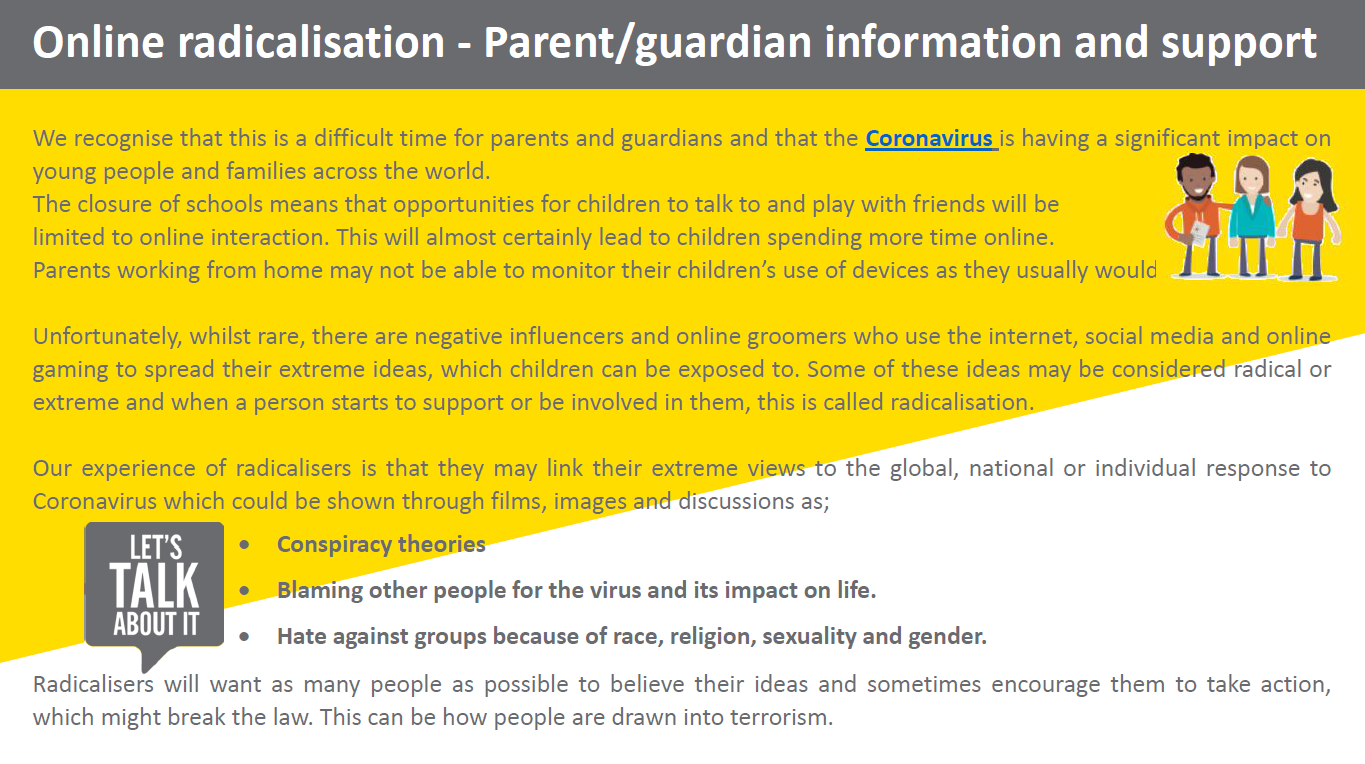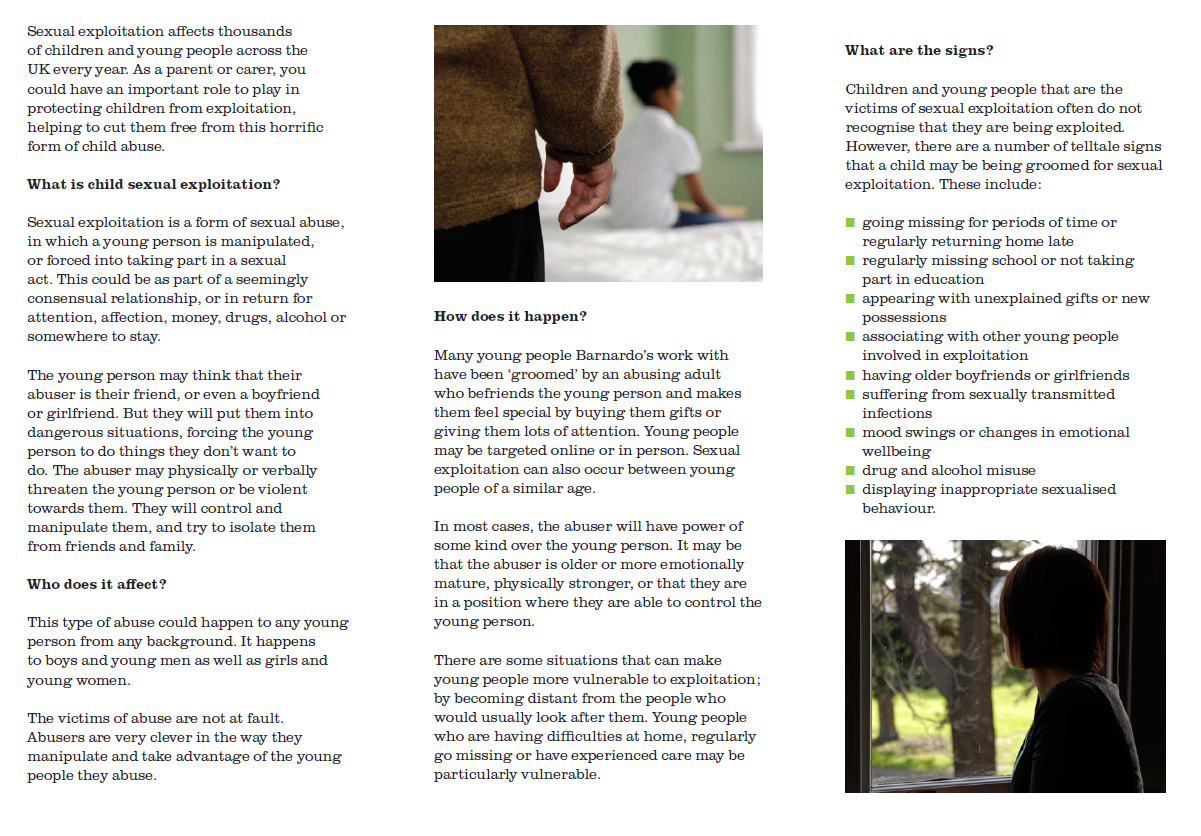Useful Information
Support and Guidance for Parents/Carers and Students
We have collated below some useful information for both parents/carers and students, offering support and guidance on a variety of issues affecting young people. If you have any concerns about a young person and need to report a safeguarding concern please contact our safeguarding team here.
Useful Websites Offering Support and Guidance
General support and guidance
www.northamptonshirescb.org.uk
Forced marriage and FGM
www.gov.uk/guidance/forced-marriage
Bullying
Drugs and alcohol
Radicalisation
Online radicalisation and extremism - UK Safer Internet Centre
Mental Health
Mental Health Support from The Lowdown - NHS approved apps for mental health which we can signpost to students and parents (link)
Internet Safety
CEOP - CEOP’s website Thinkuknow - home contains lots of up-to-date information about online safety and how to report concerning incidents.
Keeping Your Child Safe From Knife Crime
Parents/Carers can play an important role in stopping knife crime becoming a part of your child’s life. Knowing the law, talking to your child about the dangers and looking out for changes in their behaviour can help keep them safe.
Know the law
Before talking to your child about knives, you need to know the facts:
- It is illegal for anyone to carry a knife if they plan to use it as a weapon – even in self defence
- Police can search anyone they suspect of carrying a knife
- Carrying a knife could mean being arrested, going to court and getting a criminal record, or even a prison sentence
Knives in school
It is a criminal offence to have a knife or other weapon on school premises. If a knife or other weapon is found on a pupil, the police will be informed, and a pupil may be excluded.
Talking to your child about knives
The best way to stop your child getting involved with knives is to talk to them about the dangers. This may not be easy as they may not want to talk about it, but keep trying as this is the first step to keeping your child safe.
You should remind them that by carrying a knife they are:
- Giving themselves a false sense of security
- Potentially arming an attacker, increasing the risk of getting stabbed or injured
- Breaking the law
Keep a look out
Sometimes there might be obvious reasons for you to think your child is carrying a knife – such as a knife going missing from the kitchen.
However, there are other more subtle signs that you and the parents/carers of your child’s friends can look out for such as:
- School is not going well or they do not want to go in to school at all
- They’ve been a recent victim of theft/bullying/mugging
- A different network of friends who may be older than your child
For further information in how to support your child please look at the following website www.knifefree.co.uk
Safety on Railways
Network Rail have asked all schools to share the dangers of railways with children in schools. An information film has been produced and this has been shown to students in all year groups through our assembly programme. The film is lead by a safety manager from Network Rail and explains in just 15 minutes why it is really important to stay safe near the track.
You can find the relevant videos here on the Learn Live website:-
Secondary school version for Year 7-11 (link)
Secondary school version for Year 12-13 (link)
Child Sexual Exploitation
Sexual exploitation is a form of sexual abuse, in which a young person is manipulated or forced into taking part in a sexual act. This could be as part of what seems to be a consensual relationship, or it could be in return for attention, affection, money, drugs, alcohol or somewhere to stay.
The young person may think that their abuser is their friend, boyfriend or girlfriend, but the abuser will put them into dangerous situations, forcing the child or young person to do things that they don't want to do. The abuser could threaten them or be violent towards them.
Spotting the signs
The signs can be very difficult to identify. Young people who are being sexually exploited may:
- Be involved in abusive relationships, intimidated and fearful of certain people or situations
- Hang out with groups of older people, or anti-social groups, or with other vulnerable peers
- Associate with other young people involved in sexual exploitation
- Get involved in gangs, gang fights, gang membership
- Have older boyfriends or girlfriends
- Spend time at places of concern, such as hotels or known brothels
- Not know where they are, because they have been moved around the country
- Go missing from home, care or education.
What is 'grooming'?
The process known as 'grooming' is designed to isolate the child, break down the relationship with parents, carers and friends and so make the child easier to manipulate.
Signs of 'grooming' can be hard to spot. Children may:
- Be very secretive, including about what they are doing online
- Have money, cigarettes and new things such as clothes or mobile phones that they can't or won't explain
- Go to unusual places to meet friends
- Have access to drugs and alcohol.
In older children, signs of grooming can easily be mistaken for 'normal' teenage behaviour, but you may notice unexplained changes in behaviour or personality, or inappropriate sexual behaviour for their age.
Download the 'Tackling CSE Toolkit' for parents and carers
NSCB has produced a 'toolkit' to help parents and carers recognise Child Sexual Exploitation and provide them with practical advice on how to keep their children safe.
The toolkit is a document divided into chapters. For parents and carers, they recommend reading chapter 1 and chapter 8 of the toolkit. These can be downloaded below:
Tackling CSE Toolkit Chapter 1 - What is CSE and what do I need to know?
Tackling CSE Toolkit Chapter 8 - Information for parents and carers
Further information can be found in the Barnardo’s short leaflet for parents and careers about child sexual exploitation
Further help can be found at the following;
Call or text the young people's CSE helpline on 116 000
This is a new national helpline for young people to call or text if they have concerns for themselves or a friend about child sexual exploitation. It's free, anonymous and open 24 hours, 365 days per year.
Pace – Parents against child exploitation (link)
Mental Health
Helplines
Talking things through usually helps! These lines are available if you need to talk to someone or if you feel at risk in any way.
Papyrus: Thinking about suicide, please call 0800 068 4141 or TEXT 07786 209697
Bullying UK: 0808 800 2222
Child Line: Talk to a child line counsellor, no problem too big or small! 0800 1111
Samaritans: Someone to listen 24/7 free of charge. 116 123 or TEXT 07725 909090
Compass: Support and advice for young people using substances. 0800 121 4043
Northampton CAB: Information and advice on issues facing young people. 03444 111 444
NSPCC: If you feel you or someone you know is a victim of abuse. 0808 800 5000
Stonewall: Support for anyone around issues of sexuality. 0800 0505 2020
Winston’s Wish: Helpline to support young people with the death of a loved one. 08088 020 021
Apps
These free apps mean you can access support wherever you are
Stressheads: Support to lower our stress levels.
Stay Alive: Support to those who may experience suicidal thoughts/feelings.
Self Help Anxiety Management (Samapp): Support and techniques to help manage anxiety and panic.
Moodometer: Created by the NHS. Allows you to track your moods and what has influenced it. Also provides ways to lift your mood.
Calm Harm: Activities to assist in the management of self-harm.
Grief support for young people: Information about grief, bereavement and the feelings we may experience when we lose a loved one.
Insight Timer: A large collection of free guided exercises to help relieve stress, improve relaxation and wellbeing.
Calm: A large collection of exercises designed to calm us down.
Websites
www.nshn.co.uk (National self-harm network)
www.nspcc.org.uk (Info on self-harm/abuse)
www.stonewall.org.uk (support around sexuality)
Videos on YouTube
YouTube can be used to access thousands of free videos which can help us improve our wellbeing. Some suggested search terms might be:
- Progressive muscle relaxation
- Guided mindfulness
- Stress relief
- Guided sleep exercise
- Guided meditation
- Guided relaxation
- Letting go of anger



